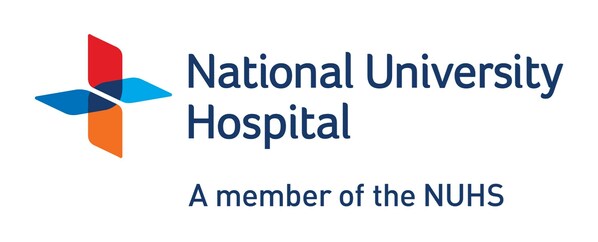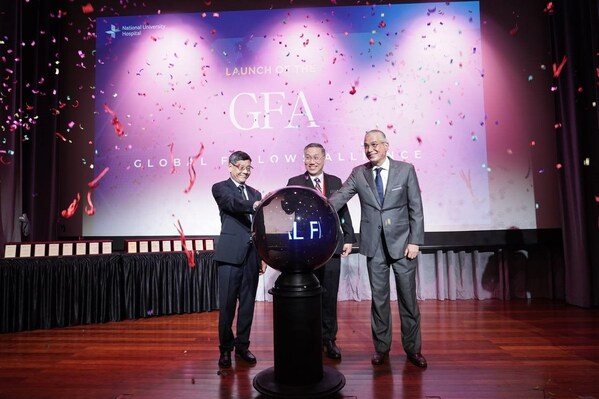 |
Fellows trained in NUH have emerged as leaders who are catalysing change in their respective fields upon their return home
SINGAPORE, Oct. 19, 2023 /PRNewswire/ -- In line with its mission of being Singapore's leading university hospital, the National University Hospital (NUH) is launching its highly anticipated Global Fellows Alliance. This is a pioneering initiative that aims to open doors for clinicians to engage with one another, collaborate on innovative healthcare solutions, and contribute to the advancement of medical knowledge in the region and beyond.

(From left) Professor Yeoh Khay Guan, Chief Executive, National University Health System; Professor Quek Swee Chye, Chairman, Medical Board, National University Hospital (NUH); and Professor Aymeric Lim, Chief Executive Officer, NUH, at the launch of NUH’s Global Fellows Alliance.
Since 2000, over 900 clinical fellows and clinicians from around the world have passed through the doors of NUH to gain exposure to Singapore's healthcare industry and hone their skills in various clinical specialties through the hospital's clinical fellowship scheme.
These clinicians hail from various parts of the world, ranging from regional countries such as Myanmar and Bangladesh, to as far afield as Oman, Italy and Switzerland.
On 19 October, more than 50 of these fellows are gathering back in Singapore for the official launch of the Global Fellows Alliance.
A global community of medical leaders dedicated to advancing healthcare
The Global Fellows Alliance will offer a unique blend of educational activities, professional development and networking opportunities. The key features of the programme include:
Networking opportunities: Connect, collaborate, and exchange expertise within a global network. The programme will facilitate connections with healthcare professionals from diverse backgrounds, creating an extensive network of clinicians who can share knowledge and best practices.
Professional development: Tailored workshops, training and coaching for continual growth. These will cover a wide range of medical disciplines.
Extensive resources: Members can stay updated with the latest in medicine through access to comprehensive resources
A community of leaders: Collaborate on research and drive meaningful and groundbreaking improvements in healthcare, across communities.
For more than two decades, NUH has trained an average of about 50 clinical fellows every year as part of its clinical fellowship scheme. These clinical fellows are attached to NUH for about six to 12 months, across specialties that span across Hand & Reconstructive Microsurgery, Cardiothoracic and Vascular Surgery, Organ Transplantation, Obstetrics & Gynaecology and Neurology, among others.
Many of the fellows have subsequently gone on to apply the knowledge they have gained and become leaders in their respective fields when they return home (see Annex A).
Professor Quek Swee Chye, Chairman of the Medical Board at NUH, said: "Healthcare knows no borders and the Global Fellows Alliance is a testament to our shared commitment to strengthening healthcare excellence on a global scale. Together, we want to exchange knowledge, foster innovation, and ultimately transform healthcare for the better, not only in our local community, but around the world.
"Our aspiration is that the clinicians who join us from around the world will return to their communities with newfound expertise, passion and the desire to make a real impact on healthcare. We believe that by nurturing and empowering these global medical leaders, we can create a ripple effect of change that reaches far beyond Singapore and our hospital walls."
About the National University Hospital (NUH)
The National University Hospital (NUH) is Singapore's leading university hospital. While the hospital at Kent Ridge first received its patients on 24 June 1985, our legacy started from 1905, the date of the founding of what is today the NUS Yong Loo Lin School of Medicine. NUH is the principal teaching hospital of the medical school.
Our unique identity as a university hospital is a key attraction for healthcare professionals who aspire to do more than practise tertiary medical care. We offer an environment where research and teaching are an integral part of medicine, and continue to shape medicine and transform care for the community we care for.
We are an academic medical centre with over 1,200 beds, serving more than one million patients a year with over 50 medical, surgical and dental specialties. NUH is the only public and not-for-profit hospital in Singapore to provide trusted care for adults, women and children under one roof, including the only paediatric kidney and liver transplant programme in the country.
The NUH is a key member of the National University Health System (NUHS), one of three public healthcare clusters in Singapore.
Annex A
NUH's Global Fellows: Catalysing Changes in Healthcare
Dr Aye Kyaw Khant and Yangon Children's Hospital's first paediatric renal transplant (Myanmar)
Dr Aye Kyaw Khant was a Clinical Fellow with the Division of Paediatric Nephrology, Dialysis and Renal Transplantation within the Department of Paediatrics, Khoo Teck Puat – National University Children's Medical Institute (KTP-NUCMI), from 2014 to 2015, under the supervision of Professor Yap Hui Kim and her renal team.
Dr Aye Kyaw Khant is currently a Consultant at the Yangon Children's Hospital. Following his return to Myanmar after his training, he applied his knowledge in areas such as acute kidney injury, chronic kidney disease, renal transplant and various renal conditions. In 2018, the Yangon Children's Hospital completed their first paediatric renal transplant with the help of the International Society of Nephrology and NUH, with Dr Aye Kyaw Khant being an instrumental part of the team. In 2020, Dr Aye Kyaw Khant also performed continuous renal replacement therapy (CRRT) to help a liver transplant patient. Since then, he has been training doctors and nurses all over the country in dialysis.
"Without the fellowship training at NUH, I would not be a paediatric nephrologist. Through the Global Fellows Alliance at NUH, knowledge transcends borders, turning individual learnings into collective advancements in healthcare," shared Dr Aye Kyaw Khant.
Dr Brig Gen (Professor) Md Mosleh Uddin and the Combined Military Hospital's Bone Marrow Transplant Centre (Bangladesh)
Dr Brig Gen (Professor) Md Mosleh Uddin was a Clinical Fellow with the Department of Haematology-Oncology in 2013, where he worked under the guidance of his mentors Dr Tan Lip Kun and Dr Liu Te Chih. Together with two other haematologists who completed their fellowship training on haematology and bone marrow transplant (BMT) procedure at NUH, Dr Brig Gen (Professor) Md Mosleh Uddin and his team established a modern bone marrow transplantation centre at the Combined Military Hospital (CMH) in Dhaka, Bangladesh.
Dr Brig Gen (Professor) Md Mosleh Uddin is currently an adviser haematologist at the CMH Dhaka, where 75 bone marrow transplants have been performed at its BMT centre. Many of their patients have made a full recovery and are living a healthy and normal life.
"The Global Fellows Alliance is a very innovative step for broadcasting learning and experiences amongst all fellows, and is very much welcome for the benefit of cancer patients in both the region and the global community," said Dr Brig Gen (Professor) Md Mosleh Uddin.
Dr Paul Jonathan and the spine service at the Santo Borromeus Hospital, Bandung (Indonesia)
Dr Paul Jonathan was a Clinical Fellow with the Orthopaedics, Hand & Reconstructive Microsurgery cluster of NUH in 2020.
Following his fellowship, Dr Paul Jonathan is building a spine service at the Santo Borromeus Hospital, where he is a consultant.
"My training as a Spine Fellow in Singapore has become an important milestone in my life, especially in my career as a spine surgeon. The skills that I learnt from my great teachers at NUH built the shape of care for my patients. I am hoping my hospital can become one of the main spine services in the community," said Dr Paul Jonathan.
Dr Noreen Nasir and meeting the needs of rheumatic disease care in Pakistan (Pakistan)
Dr Noreen Nasir is currently a Clinical Fellow with the Division of Rheumatology, Department of Medicine, NUH. Rheumatology involves in-depth knowledge of rare and uncommon autoimmune diseases.
"Only a few training centres exist in the country, centred in big cities to cater for a population of 223 million. According to the Pakistan Society for Rheumatology, there are 80 trained rheumatologists, whereas 3,000 to 4,000 are required to meet the needs of our population. It has led to suboptimal care of rheumatic diseases in Pakistan," said Dr Noreen Nasir.
"Singapore has regionally recognised centres of excellence in rheumatology, and the division of rheumatology at NUH has been designated as the Asia Pacific League of Associations for Rheumatology (APLAR) Centre of Excellence. I am fortunate to have been allowed to be trained in recognising, naming, and treating rare and often obscure autoimmune conditions. Clinical fellowship training would help mitigate our country's general shortage of trained rheumatologists," she added.
Dr Sherwin Jae G. Enriquez and providing the best care to diverse patients (Philippines)
Dr Sherwin Jae G. Enriquez is currently a Clinical Fellow with the Department of Anaesthesia at NUH.
Beyond the skills he learns, he also hopes to bring with him "the values – respect for all colleagues, continuous hunger for learning and enthusiasm to teach – that this institution has inculcated in me".
"Different countries would have different ways and practices in giving care to patients based on the profiles of their population – age, sex, gender, race. It is through the Global Fellows Alliance that we can continuously learn and update one another on practices that can benefit the diverse patients that we will encounter in the future," he added.